Personality-sensitive technology of psychological adaptation of athletes to competitive conditions
Фотографии:
ˑ:
PhD, Associate Professor M.A. Kuzmin1
PhD, Associate Professor N.N. Smirnova2
O.V. Kostromin2
1Plekhanov Russian University of Economics, Moscow
2Saint-Petersburg Mining University, Saint-Petersburg
Objective of the study was to develop a personality-sensitive technology of psychological adaptation of athletes to competitive conditions.
Methods and structure of the study. The study involved 563 athletes of various specializations, including 138 subjects involved in cyclic sports (cross-country skiing), 142 – in team sports (basketball), 144 – in artistic sports (figure skating), 139 – in martial arts (judo). We used the analysis of scientific literature, factor analysis, methods of M.A. Kuzmina and A.N. Nikolaev.
Results of the study and conclusions. Three groups of athletes were formed: Group 1 – athletes characterized by high emotionality and high level of motivation, Group 2 – those characterized by high emotionality and low level of motivation, and Group 3 – those characterized by low emotionality and low level of motivation.
For each group of athletes, we developed the tasks aimed to accelerate and improve their psychological adaptation to competitive conditions with due regard to the athletes’ psychological qualities.
The data obtained, as well as the differentiated approach to the athletes’ psychological adaptation enabled to increase the level of athletes' adaptation to competitive conditions, and, accordingly, contribute to successful competitive performance.
Keywords: differential sport psychology, psychological adaptation, competitive conditions, personality traits, emotionality, motivation.
References
- Izotov E.A., Smirnova N.N. Vliyanie ideomotornoy trenirovki na mobilizatsionnuyu gotovnost igrokov v darts [Ideomotor training to facilitate darts player's precompetitive mobilisation rate]. Teoriya i praktika fiz. kultury. 2017. no. 5. pp. 53-55.
- Kuzmin M.A. Differentsialnaya sportivnaya psikhologiya [Differential sport psychology]. Teoriya i praktika fiz. kultury, 2018, no. 4, pp. 5–7.
- Kuzmin M.A. Psikhologicheskaya adaptatsiya k usloviyam sorevnovaniy v edinoborstvakh [Psychological adaptation to conditions of martial arts competitions]. Teoriya i praktika fiz. kultury, 2017, no. 5, pp. 37–39.
- Kuzmin M.A., Zarodnyuk G.V., Larionova M.N. Psihologicheskaya adaptatsiya k usloviyam sorevnovaniy v tsiklicheskikh vidakh sporta [Psychological adaptation in cyclic sports]. Teoriya i praktika fiz. kultury. 2019. no, 4. pp. 96-98.
- Rudenko G.V., Dubrovskaya Yu.A., Bobrov I.V. Metodika opredeleniya psikhofiziologicheskogo potentsiala organizma [Individual psychophysiological potential test model]. Teoriya i praktika fiz. kultury, 2018, no. 4, pp. 8-10.
- Savelyev D.S., Sidorenko S.A. Vliyanie zanyatiy sportivnymi edinoborstvami na psikhofiziologicheskiy potentsial studentov – pervokursnikov [Effects of competitive martial arts on first-year students' psychophysiology]. Teoriya i praktika fizicheskoy kultury. 2017. no. 5. pp. 43-45.



 Журнал "THEORY AND PRACTICE
Журнал "THEORY AND PRACTICE